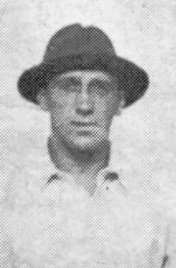José María Belauste
 Belauste in 1920 | |||
| Personal information | |||
|---|---|---|---|
| Full name | José María de Belausteguigoitia Landaluce | ||
| Date of birth | 3 September 1889[1] | ||
| Place of birth | Bilbao, Spain | ||
| Date of death | 4 September 1964 (aged 75) | ||
| Place of death | Mexico City, Mexico | ||
| Position(s) | Midfielder | ||
| Senior career* | |||
| Years | Team | Apps | (Gls) |
| 1905–1926 | Athletic Bilbao | 93 | (20[2]) |
| International career | |||
| 1920 | Spain | 3 | (1) |
| *Club domestic league appearances and goals | |||
| Medal record | ||
|---|---|---|
| Men's football | ||
| Representing | ||
| Olympic Games | ||
| 1920 Antwerp | Team competition | |
José María de Belausteguigoitia Landaluce (3 September 1889 – 4 September 1964), known as Belauste, was a Spanish footballer who played as a midfielder.
Club career[edit]
Born in Bilbao, Biscay, Belauste played with Athletic Bilbao from ages 15–36. His game was based on a physical display, as he stood at 1.93 meters and weighed 95 kilograms.

He made his debut for his only club on 4 April 1909 in a 2–4 loss against Club Ciclista de San Sebastián, and won six Copa del Rey trophies during his tenure.[3][4]
International career[edit]
Belauste won three caps for Spain, representing the nation at the 1920 Summer Olympics in Belgium and helping it win silver, as captain. His debut came during the tournament in a 1–0 win against Denmark, and in the second game, against Sweden, he was immortalized in the annals of Spanish football: in the play that led to the 1–1 equaliser, he reportedly shouted to teammate Sabino Bilbao "¡A mí el pelotón, Sabino, que los arrollo!" ("Send me that ball, Sabino, I'll crush them!" in Spanish).[5] This was subsequently viewed as the reason why the national team was dubbed Furia Roja (Spanish Fury).[3]
Personal life / Death[edit]
Belauste was one of nine children born to a middle-class family. He majored in law from the University of Deusto while still an active player, and later worked as a lawyer.
Two of Belauste's brothers played alongside him for Athletic (though not coinciding with one another in official matches): Ramón[6] between 1913 and 1915 – winning the Copa del Rey in 1914 and 1915 – and Patxo[7] between 1919 and 1922, lifting the trophy in 1921 before he moved to Paris to study alongside Marie Curie;[3] he was also a talented athlete who achieved a silver medal in the discus throw event at the 1925 edition of the Spanish Athletics Championships.[8]
Belauste was also active in politics, being affiliated to the Basque Nationalist Party and responsible for its sports section. During a meeting in 1922, he shouted "Death to Spain!"; additionally, he almost did not receive his Olympic medal, due to the fact he refused to carry the Spanish flag in the parade.
After his voluntary exile, first to France, then Algeria, Argentina and Brazil, Belauste returned home, but left for Mexico after the start of the Spanish Civil War. He died on 4 September 1964 in Mexico City at the age of 75, from lung cancer.[3]
Honours[edit]
Club[edit]
- Copa del Rey: 1910, 1911, 1914, 1915, 1916, 1921
- Biscay Championship: 1913–14, 1914–15, 1915–16, 1919–20, 1920–21
International[edit]
References[edit]
- ^ José María Belauste at Olympedia
- ^ https://www.athletic-club.eus/en/players/jose-maria-belaustegigoitia-landaluce
- ^ a b c d Rivas, Jon (15 June 2008). "El inspirador de la "furia española" fue un vasco" [The inspirer of the "Spanish fury" was a Basque]. El Mundo (in Spanish). Retrieved 13 May 2015.
- ^ "Leyendas del Athletic Club de Bilbao – 'Belauste'" [Athletic Club de Bilbao legends – 'Belauste']. El Correo (in Spanish). Retrieved 23 May 2016.
- ^ Garma, Jorge (23 December 2005). "Algo más que un grito" [More than a cry]. El País (in Spanish). Retrieved 13 May 2015.
- ^ "Ramón Belauste". Athletic Bilbao. Retrieved 23 September 2017.
- ^ "Patxo Belauste". Athletic Bilbao. Retrieved 23 September 2017.
- ^ Ramos, Jesús (30 May 2015). "Belauste, Beltrán de Lis y la primera final Barça-Athletic" [Belauste, Beltrán de Lis and the first Barça-Athletic final]. Marca (in Spanish). Retrieved 8 November 2019.
External links[edit]
- José María Belauste at Athletic Bilbao
- José María Belauste at BDFutbol
- José María Belauste at National-Football-Teams.com
- José María Belauste – FIFA competition record (archived)
- José María Belauste at EU-Football.info
- Evans, Hilary; Gjerde, Arild; Heijmans, Jeroen; Mallon, Bill; et al. "Belauste (José María Belausteguigoitia Landaluce)". Olympics at Sports-Reference.com. Sports Reference LLC. Archived from the original on 2020-04-18.
- 1889 births
- 1964 deaths
- Spanish men's footballers
- Footballers from Bilbao
- Men's association football midfielders
- Athletic Bilbao footballers
- Spain men's international footballers
- Olympic footballers for Spain
- Footballers at the 1920 Summer Olympics
- Footballers at the 1924 Summer Olympics
- Olympic medalists in football
- Medalists at the 1920 Summer Olympics
- Olympic silver medalists for Spain
- Basque Country men's international footballers
- Spanish male discus throwers
- Basque nationalists
- Spanish emigrants to Mexico
- Exiles of the Spanish Civil War in Mexico
- Deaths from lung cancer in Mexico
